The views expressed in our content reflect individual perspectives and do not represent the authoritative views of the Baha'i Faith.
It is said that no one truly knows a nation until one has been inside its jails. A nation should not be judged by how it treats its highest citizens, but its lowest ones. – Nelson Mandela
Have you ever been in prison?
Actually, maybe I should rephrase the question using one more word: Have you ever been in a prison? If not, I recommend it highly. No, I don’t mean being incarcerated—I mean visiting a prison, or a prisoner, to see how your society treats the people it locks up.
I had a remarkable prison experience myself, when a friend of mine who taught English in an American penitentiary asked me to fill in for him one fall semester. I’m sure my students—a dozen male felons—taught me much more than I taught them.
Here’s the shorthand version of the six major lessons I learned:
- Do not do anything that would even potentially put you in prison. Ever.
- We think of prisons as places filled with psychopaths, like in the movies—but prisons mainly house normal people who, at some point in their lives, made one really bad decision, or a series of them, and got caught.
- In fact, most prisoners—some statistics say it’s as high as 85%–wind up behind bars because they developed, in their early years, an addiction to alcohol or other drugs.
- Those of us who have our freedom tend to take it for granted—until it’s gone.
- Prison takes away your physical freedom—but it can also take away your spirit.
- There, but for the grace of God, go you or I.
When I taught that English class, I went to the prison every Wednesday night for a semester. At first I had some trepidation—probably anyone would—but that quickly dissipated. I soon found that I liked the prisoners I taught—lively, curious and eager to learn, they made my classes really interesting. Some were quiet, some were funny, some had enormous intellectual gifts. One guy—an African American teenager who had dropped out of high school to sell crack—had a genius-level IQ, and one of the finest and quickest minds I’ve ever encountered anywhere. Of course, the prisoners I taught had earned the privilege of taking a class with their good behavior, so none of them posed any danger to each other, or to me. I never once felt threatened or unsafe there.
One of my students told me “Hey, teach—when you come for the class next week, don’t park in the parking lot. Instead, park your car right next to the wall by the north guard tower, and leave the keys in the ignition!” I laughed so hard the first time he repeated the joke every Wednesday. Maybe he was only half-joking.
Or maybe, just maybe, he used humor to point out the obvious difference between us—I could leave and he couldn’t.

Anyway, my prison experience led me into a new world that I’d never encountered before, and one that few people on the outside ever encounter. It made me appreciate, in a small, second-hand way, what it’s like to be locked up. It gave me a better sense of my own freedom. Ultimately, it made me think long and hard about justice, and what it means to a prisoner. I began reading everything I could get my hands on about criminal justice and its reform. All of that led me to the Baha’i teachings about reward and retribution; right and wrong; justice and injustice; and the proper way for society to deal with the law and those who break it. In this series of essays on those subjects, we’ll look at the issues, examine the ways our societies currently deal with crime and punishment, and explore the criminal justice solutions the Baha’i teachings offer to society.
Let’s look, first, at the big picture—the everlasting law of reward and retribution.
When he was in Paris, France in 1913, Abdu’l-Baha gave a remarkable talk about those two subjects:
In the conduct of life, man is actuated by two main motives: “The Hope for Reward” and “The Fear of Punishment.”
This hope and this fear must consequently be greatly taken into account by those in authority who have important posts under Government. Their business in life is to consult together for the framing of laws, and to provide for their just administration.
The tent of the order of the world is raised and established on the two pillars of “Reward and Retribution.”
In despotic Governments carried on by men without Divine faith, where no fear of spiritual retribution exists, the execution of the laws is tyrannical and unjust.
There is no greater prevention of oppression than these two sentiments, hope and fear. They have both political and spiritual consequences.
If administrators of the law would take into consideration the spiritual consequences of their decisions, and follow the guidance of religion, “They would be Divine agents in the world of action, the representatives of God for those who are on earth, and they would defend, for the love of God, the interests of His servants as they would defend their own.” If a governor realizes his responsibility, and fears to defy the Divine Law, his judgments will be just. Above all, if he believes that the consequences of his actions will follow him beyond his earthly life, and that “as he sows so must he reap”, such a man will surely avoid injustice and tyranny.
Should an official, on the contrary, think that all responsibility for his actions must end with his earthly life, knowing and believing nothing of Divine favours and a spiritual kingdom of joy, he will lack the incentive to just dealing, and the inspiration to destroy oppression and unrighteousness.
When a ruler knows that his judgments will be weighed in a balance by the Divine Judge, and that if he be not found wanting he will come into the Celestial Kingdom and that the light of the Heavenly Bounty will shine upon him, then will he surely act with justice and equity. Behold how important it is that Ministers of State should be enlightened by religion!
…Justice is not limited, it is a universal quality. Its operation must be carried out in all classes, from the highest to the lowest. Justice must be sacred, and the rights of all the people must be considered. Desire for others only that which you desire for yourselves. Then shall we rejoice in the Sun of Justice, which shines from the Horizon of God.
Each man has been placed in a post of honour, which he must not desert. A humble workman who commits an injustice is as much to blame as a renowned tyrant. Thus we all have our choice between justice and injustice.
I hope that each one of you will become just, and direct your thoughts towards the unity of mankind; that you will never harm your neighbours nor speak ill of any one; that you will respect the rights of all men, and be more concerned for the interests of others than for your own. Thus will you become torches of Divine justice, acting in accordance with the Teaching of Baha’u’llah, who, during His life, bore innumerable trials and persecutions in order to show forth to the world of mankind the virtues of the World of Divinity, making it possible for you to realize the supremacy of the spirit, and to rejoice in the Justice of God. – Paris Talks, pp. 157-160.
You May Also Like
Comments



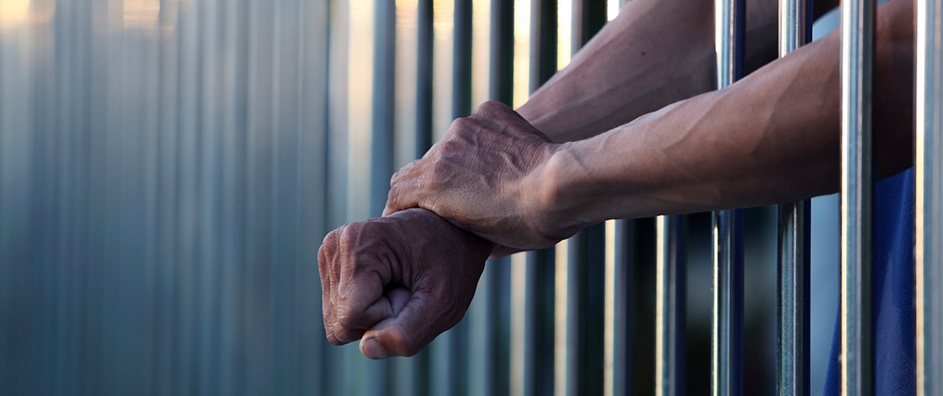



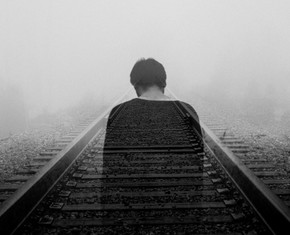



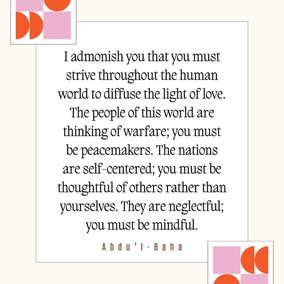
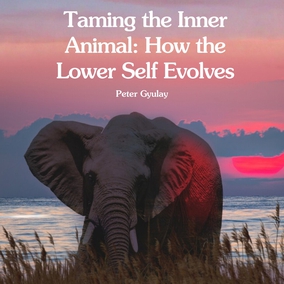
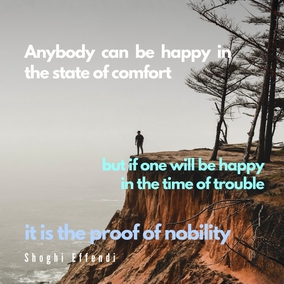
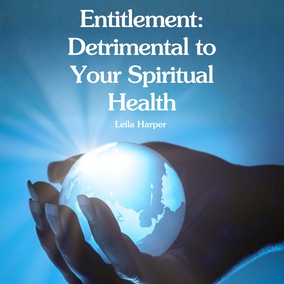
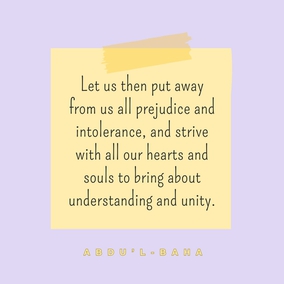

Dostoevsky or Tolstoy maybe said
something like that, as well. We free
ones should never feel at peace if
we know something of what can happen to the lives put out of sight.
It's really a moral crime that some
officials have thrived politically by
catering to our desire to not know.
It's good that Michelle Alexander
of "The New Jim Crow", Bryan Stevenson of "Just Mercy", and
others are trying to thwart the denial.
To be realistic, very many people
behind bars are dyed-in-the-wool
manipulators ...who systematically
use others whenever possible. Anybody dismissing that should
have little credibility with the folks
who must work on the streets and
in facilities to protect society. Still,
all people deserve fair treatment.
Your sixth point is obvious, but we
should probably remind ourselves
every day: "I could be her/him."!!
I also really like the discussion of
what deters wrongdoing, both
the materialistic and the spiritual
consequences!
The first time I went to jail was as 15 years old, caught driving without a license with a much older male "friend." Those two weeks inside "Juvie" would have been much shorter ...if there hadn't been open beer bottles with us. While there I was mocked mercilessly by other male youth because my "friend" was a well-known prowler. At least I didn't get in a meaningless fight there as I had with an inmate wielding a mop in County.
It wasn't until I fell in love with the Baha'i Teachings that I changed my ways, together with the dependable love of my girlfriend and future wife.
Life lessons are to be learned, not swallowed, and ultimately I learned mine.
Thanks for this article....